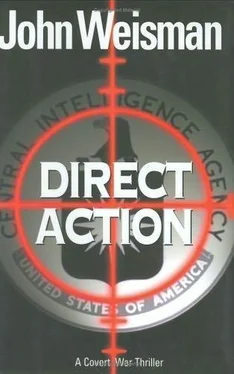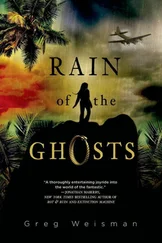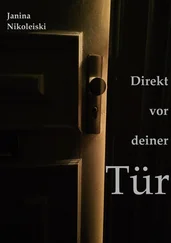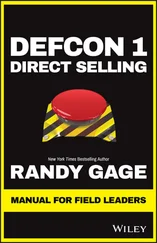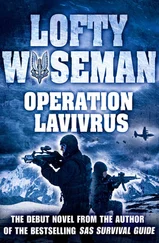McGee knew the real thing when he saw it, and Rudy was it.
The second spook was a thirtysomething youngster dressed in Eurochic and Levi’s who said his name was Tom. Tom had an engaging smile and a laid-back, surfer-dude attitude. But from the way he moved, the way he held himself, the way his eyes took everything in without appearing to even move, McGee understood Tom was a case officer-maybe even one of the few good ones.
Tom unzipped a black canvas briefcase, brought out a sealed brown envelope, and laid it on the table. Then he spoke to McGee in rapid, flawless Arabic. “Inside this envelope is a nondisclosure form. If you understand what I’m telling you, slide the envelope across the desk-don’t lift, just slide-open it, read the form, then sign. After you do, we can tell you why we’ve come to see you.”
“It is my pleasure to do so, sir,” McGee answered in Arabic. Then he dropped a big index finger atop the heavy brown paper, drew the envelope to his side of the table, slit the end with the thick sharp blade of his Emerson folder, read the one-page boilerplate agreement, and signed.
They’d wanted to see if he understood Arabic well enough to respond properly. He’d just shown them he did. It also meant the job-whatever it might be-was somewhere in the Middle East.
Well, McGee liked the Middle East, and working for a CIA front company was all right by him. He was thirty-nine, he’d had twenty-two years of Soldiering, and it was time for him to go. Time to make some money for his family. He had an ex-wife and two teenage boys to support, and he was dedicated to them.
Besides, it had been a long ride. He’d begun his Delta selection process just as the Unit was preparing to leave for Somalia. He’d finished his specialized schools-denied area operations, Arab language, State’s VIP protection course, safecracking, and other miscellaneous black arts-just as four of Delta’s Spanish-language specialists left for Colombia to help track down and kill El Doctor, the notorious Medellín drug cartel boss Pablo Escobar.
He’d spent most of 1994 and 1995 commuting between Jordan, where he instructed the Royal Jordanian Army’s elite Black Beret commandos in close-quarters combat and hostage rescue, and Israel, where he trained and then worked with Sayeret Duvdevan, Israel’s Special Forces counterterrorist unit. 5He’d been posted to Beirut under State Department cover to help protect the ambassador right after the 1998 Africa embassy bombings. McGee’s time as a part of a Mistaravim, or undercover Arab-speaking Israeli unit, had given him the skills necessary to operate in Beirut’s southern suburbs observing Hezbollah, and in the Bekáa Valley, where he spied on Islamic Revolutionary Guard Corps personnel headquartered in Baalbek.
McGee’s familiarity with the Middle East-especially Israel and Lebanon-was what the Langley guys were interested in. It was all very straightforward stuff, Rudy said. “We’re talking ‘Espionage 101’: you keep your eyes open and your mouth shut. Nothing more than you did in Lebanon-except this time you’re not reporting to ISA 6but to us.”
Tom checked McGee’s signature on the nondis, then provided some background. There was, he said derisively, only one Arabic-speaking case officer currently assigned to Tel Aviv. She worked under embassy cover but her Agency affiliation was known to the Palestinians with whom she liaised. Moreover, the fact that she was a woman compromised her ability to work in Gaza even if her status hadn’t been acknowledged. From the way Tom described the situation, McGee understood that things at Tel Aviv station were FUBAR’d.
So, McGee asked, what’s the problem?
The problem? Rudy didn’t mince words. “CIA is effing eyeless in Gaza. The station chief refuses to recruit agents. That’s the problem. Full stop.”
The younger guy had shot Rudy a look. But when McGee pressed him, Tom had gone even further. CIA had no unilateral sources in the entire Gaza Strip. No access agents. No penetration agents. Not one single unilateral asset. CIA had trained more than twelve hundred Palestinian security personnel over the past half decade. But between bureaucratic infighting, blockheaded, risk-averse management, and just plain incompetence, Langley hadn’t managed to recruit a single one.
And therein lay the rub. All hell was breaking loose in Washington because CIA hadn’t had unilateral agents in Iraq before the war. There’d been satellite photos, of course. And signals intercepts by the thousands-so many that No Such Agency’s Arab-speaking translators were still working on material from 2001. But all of the human-source intelligence on which George W. Bush had based his decision to invade Iraq-all of it; every single report-had been supplied either by defectors provided by Iraqi resistance groups or through CIA’s liaison relationships with the Brits, the Germans, the Israelis, the Saudis, and the Jordanians.
That dependence on liaison, Tom growled, caused huge problems. When McGee asked how, Tom explained.
“Let’s say,” he said, “CIA gets a liaison report from MI6. The report says a trusted MI6 agent working in the Middle East has information that Saddam Hussein has developed mobile chemical weapons labs. The info-bit fits CIA’s preconceived picture about Saddam’s weapons-of-mass-destruction program. But it’s uncorroborated. Uncorroborated is unacceptable. But Langley doesn’t have any unilateral sources in Iraq. Instead, they e-mail the liaisons: Anybody out there hear anything about an Iraqi mobile weapons lab program ?
“‘We did,’ Mossad answers. ‘Our military intelligence organization, AMAN, says it’s highly probable Saddam has mobile chemical/biological weapons labs moving around the country. We rate AMAN’s information source as highly credible.’
“Then CIA goes to the Iraqi defector groups. ‘You guys have anybody who knows about weapons laboratories built into tractor trailers?’ And the Iraqi National Congress or the Iraqi National Accord, figuring that CIA wants a positive response, tells CIA, ‘Sure, we hear about mobile chem/bio weapons labs all the time.’
“CIA says, ‘We want to interview a defector with firsthand knowledge.’ So INC flies a defector to Washington, where he’s interviewed and polygraphed. The defector’s polygraph, which shows no deception, is consistent with everything about mobile weapons labs CIA has learned so far.
“But the White House isn’t satisfied. The president says, ‘I won’t go to war unless we’ve nailed this down one hundred percent.’ So CIA goes to its pals in Berlin and asks about mobile weapons labs. BND, the German intelligence agency, tells CIA it interviewed an Iraqi defector pseudonymed CURVEBALL who confirmed that Saddam had mobile labs. He’d even worked on the program.
“Langley insists they want to talk to CURVEBALL. ‘Sorry,’ say the Krauts. ‘You know the rules: he is our unilateral source and we don’t compromise sources and methods.’
“No access is generally a no-no,” Tom continued. “But in this case, CIA shrugs its institutional shoulders because it doesn’t matter: the Agency now has multiple-source corroboration without talking to the BND’s source directly. Then Director of Central Intelligence George Tenet briefs the president again. And when Bush asks if Tenet is sure about his info, because the U.S. is going to war based on what CIA has uncovered, Georgie boy says, ‘Mr. President, this is a slam dunk.’ Three weeks later, a line about mobile biological weapons labs gets inserted into Secretary of State Colin Powell’s United Nations speech. When Powell asks Tenet if the information is solid, Tenet says something to the effect of not to worry, we got a triple confirmation. We’re talking twenty-four-karat.
Читать дальше
